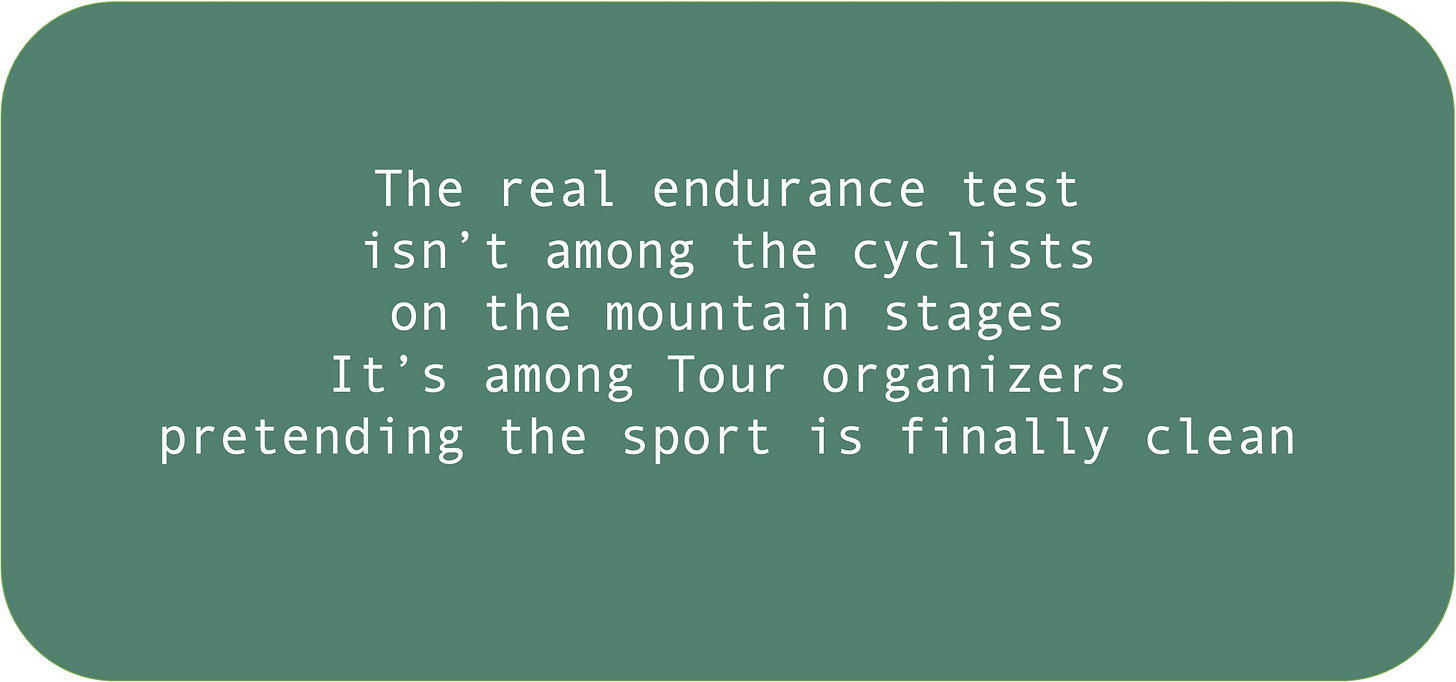Another summer, another Tour de France. And once again, cameras rolled and Lycra stretched on Saturday as 184 cyclists embarked on a feat of athleticism that now evokes more cynicism than awe. You need only a scrolling awareness of professional cycling to understand why this once-hallowed race has fallen from grace. As I wrote in 2014, the Tour lost its soul somewhere between Hinault’s betrayal and Armstrong’s needle. Cyclists have been racing in professional purgatory ever since.
I tried to watch last year. But by Stage 3 (of 21), it was clear the Tour’s soul was still lost. This year, I couldn’t even get through Stage 1 on Saturday before losing interest. Not to mention that the commentators sounded less like sports analysts and more like Rick Steves on two espressos — narrating cobblestone villages while pretending the peloton mattered. To be fair, the scenery along the 184.9 km route around Lille was far more interesting than anything happening in the peloton.
Truth be told, I just couldn’t unsee the cloud of suspicion hovering over the peloton with every kilometer. Yes, it’s been over a decade since the United States Anti-Doping Agency stripped Lance Armstrong of his seven Tour de France titles. But when he finally confessed to Oprah in 2013, he pulled back the curtain on an entire ecosystem of performance-enhancing drugs, intimidation, and institutional cover-ups. Cycling had become less a test of human endurance than a pharmaceutical arms race.
I’ve written many commentaries chronicling my own journey from Armstrong fanboy to disillusioned critic. (Internal links in the 2014 commentary I cited above attest to this.) I joined millions worldwide in heaping praise on Armstrong that should have gone to Greg LeMond. The 2014 documentary Slaying the Badger revealed why LeMond is cycling’s true American hero. But it also vindicated my disaffection with Armstrong and disillusionment with the sport itself.
Meanwhile, the world now knows that LeMond’s crusade against doping wasn’t born of jealousy toward Armstrong. It was forged in betrayal by Bernard Hinault. In 1986, LeMond became the first American to win the Tour. But the year before, he had sacrificed his own chances to help Hinault win his fifth title. In return, Hinault promised to support LeMond the following year. Instead, he tried to steal the race from him.
That violation of esprit de corps fueled LeMond’s quest to rid cycling of doping — a far more insidious betrayal. And no one personified that betrayal more than Armstrong, the man hailed as cycling’s greatest champion and golden goose. That’s why LeMond going after Armstrong was akin to Eliot Ness going after Al Capone. Of course, Armstrong ended up confessing on Oprah; Capone ended up in prison.
Which brings me to the cruel irony now haunting this sport: cycling without Lance Armstrong is like golf without Tiger Woods. Like Tiger, Lance transcended his sport in ways others haven’t matched. And just as golf without Tiger felt lifeless, so too does cycling without Lance. I’d rather watch paint dry.
As it happens, I made that exact point years ago in “Golf: More About Tiger than the Game Itself.” When Tiger wasn’t playing, fans tuned out. Ratings tanked. The sport felt irrelevant. Cycling suffered the same fate. Lance may have been a fraud, but he was compelling. Now, as commentators showed on Saturday, the drama is as manufactured as the post-race drug tests.
Of course, the 2025 Tour de France is presenting a cleaner image. And organizers are clearly trying to replace charisma with jingoism to keep viewers tuned in. But aphorisms like “a leopard never changes its spots” and “lipstick on a pig” come to mind. Simply put, professional cycling now wallows in the rogues’ gallery of sports — somewhere between WWE and professional bodybuilding.
So forgive me if I don’t cheer after Stage 21 in two weeks, when yet another cyclist raises his arms at the Champs-Élysées. I’ve seen this movie before. And perhaps that’s the real legacy of the Armstrong scandal: not that it exposed cycling’s dirty secret, but that it turned us all into irrepressible cynics. Once you’ve seen behind the curtain, it’s impossible to watch the show with the same wide-eyed wonder again.





